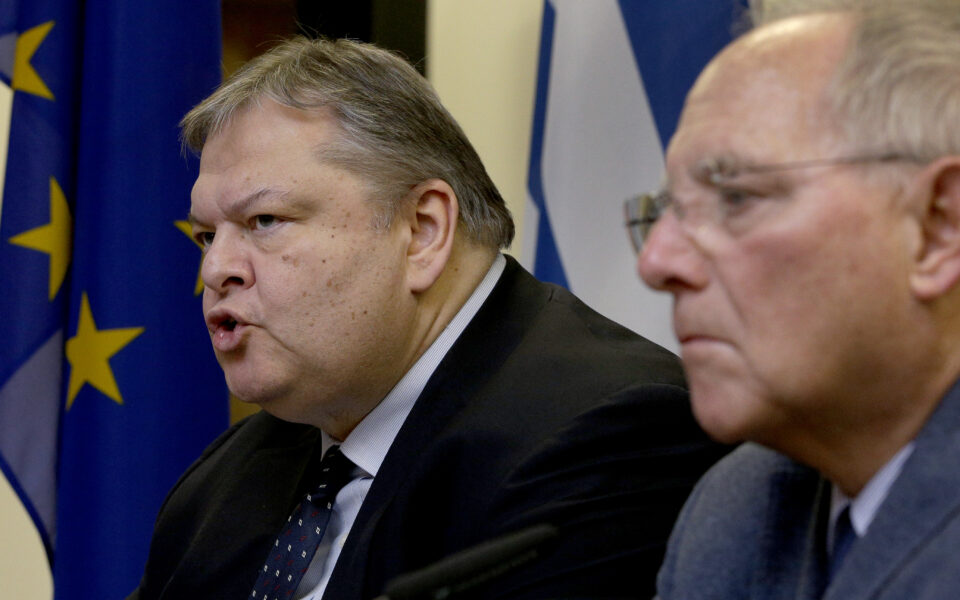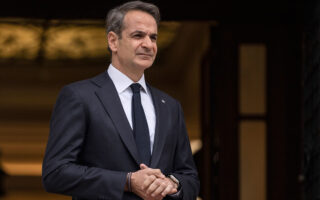Schaeuble’s last confession on Grexit
He recounted to Kathimerini what he had proposed behind the scenes

I met Wolfgang Schaeuble twice. The first one was in 2017, literally on his last day as Finance Minister. As I was entering the ministry building, they were moving boxes containing his archives, which made me wonder how many documents related to Greece were among them.
Some people who knew him well had warned me about two things: how unpredictable his mood to be and his very sarcastic sense of humor. I got a sample of this last trait when I told him, as he offered his hand. “Do you know, Mr. Schaeuble, how long I have been trying to get this interview?” He replied: “I will tell you something I’ve learned after many, many years in politics. No one has lost their job after an interview they didn’t give.” I must confess I found this remark very wise and I shared it with some Greek politicians dazzled by media overexposure. I don’t think they paid attention.
The second and last time I met Schaeuble was April 19, 2023. I had asked to see him as part of my research for a forthcoming book. He had quickly agreed and gave me over an hour to talk about the behind-the-scenes events of the financial crisis and his role in it. This time, we met at an office behind the German Parliament, the Reichstag. Schaeuble was no longer speaker, but he had been given a large office, obviously to honor him.
Most of our conversation, abut nine-tenths, was on the record. He asked me to keep the remaining 10% off the record, with the proviso that I could publish it, as well, if he reviewed and approved it.
Schaeuble gave his own account of the now famous 2011 encounter with then Finance Minister Evangelos Venizelos and George Zanias, head of the Ministry’s Council of Economic Advisors.
When Venizelos became Finance Minister in the Papandreou government, I invited him, early on in his tenure, to a small private meeting in Berlin. I invited him to dinner and we had a long conversation, with only our top aides present. I said “Evangelos, it’s impossible. You won’t be able to satisfy the terms of the (austerity) program. You have agreed to do it, you are trying, but you won’t be able to do it. It is not feasible. There are therefore two alternatives: the first is to cede parts of your sovereign rights to the European Commission, so you can have an institution outside Greece to impose the terms. The other is a timeout (from Greek membership of the euro zone). You can do a devaluation outside the euro and this devaluation will solve your problem.”
“Evangelos replied: ‘We have many problems with the economy but we are also very proud and, for this reason, we will never cede our sovereign rights to any institution, we will not become a protectorate. It’s impossible. And, in any case, I believe we will stay in the euro. So, no timeout.’”
‘He never lied to us’
Schaeuble expressed his admiration for Greece’s managing to stay in the euro, but had not changed his mind, quite the contrary, about the correctness of his view about the country temporarily exiting the common currency. He was still preoccupied, after all these years, about who convinced German Chancellor Angela Merkel to change her mind after a crucial meeting in which he thought he had convinced her to adopt his position.
Also of great interest were his recounting of the stormy negotiations in 2015. For the second time – he had said it off-the-record in our 2017 meeting – he said that then Prime Minister Alexis Tsipras “never lied to us.” He sensed that I was looking at him quizzically and repeated, “I’m saying he never lied to us, here, in Berlin.”
Schaeuble was less generous about Yanis Varoufakis, he did not spare him his sarcasm. “Varoufakis was a disaster for his country. No other minister has done as much damage to his people and his country. I think German and Anglo-Saxon media appreciated him much more than Greek ones. He was a very effective salesman and, of course, very successful in making money out of it.”
Schaeuble played a crucial role in the Greek crisis and was well aware he was the scapegoat for the Greek people’s justified rage during the huge spending cuts. Even though his opinion on the need for Greece to take a timeout from the euro was unchanged, I think he believed he was saddled with the responsibility, and backlash, for some decision he had not taken on his own, such as the involvement of the International Monetary Fund in a European country’s stabilization program. He, rightly, insisted that no matter how much money was infused into the Greek economy, most reforms would not happen because the political elites and the state lacked the willingness and ability to implement them. But he underestimated two factors: the Greeks’ combination of pride and bloody-mindedness that kept them in the euro and the geopolitical dimensions of a Grexit. But the passage of time strips history of passions, and Schaeuble will be apportioned his share of responsibility without grandstanding and acrimony.





